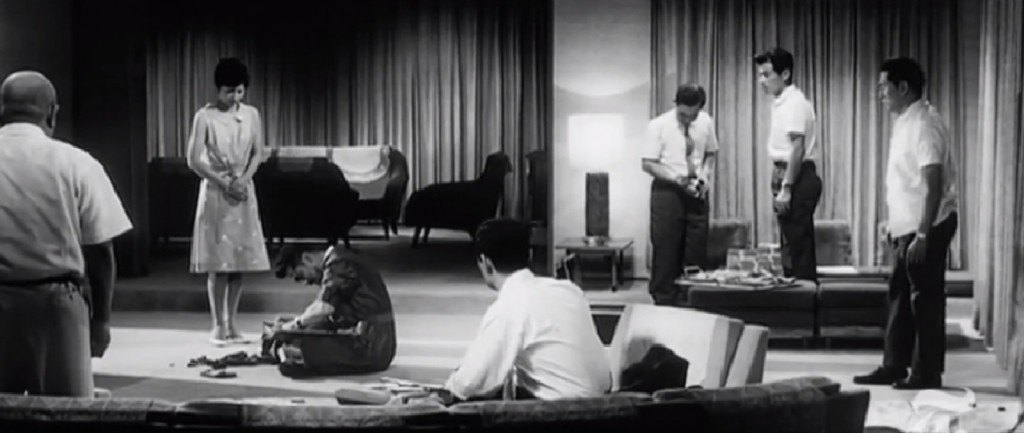As long as there have been great movies, great screenwriters, too, have flourished. Without the solid groundwork of a good script, even the greatest directors can falter at the final hurdle, and that’s why writing, along with editing, are perhaps the two most essential (and softly spoken) elements of production. Below lie some of the very finest pieces of single-scene scriptwriting ever achieved. Some make you laugh, others make you cry, and a few make me crawl up into a ball and wish the world away for a while — but every single one of them is the mark of a fantastic artist working at the top of their game. Enjoy the list of top movie dialogue scenes ever.
10. Glengarry Glen Ross – “Always be Closing”
Few screenwriters can as expertly handle the use of curse words as David Mamet and in the star-studded adaptation of his own play he hit his absolute peak. Most notable among its endless array of memorable meltdowns is the scene between Al Pacino, Kevin Spacey and Jack Lemmon in which the former fires up a blazing row. Mamet maintains a consummate sense of pace and ferocity as Pacino’s mostly quiet character explodes, exhausting his conventional insults and then transitioning to a hilarious alternate arsenal of oddball putdowns.
As Pacino heads out of the scene, Lemmon makes a passing comment to Spacey, which ignites yet another skirmish that ends decisively for the former’s tragic character—leaving him totally doomed. It’s a brilliant way to cap off the flick’s nonstop nature, assembling all the momentum built up to that point and letting all its pent-up tension out in an immaculately controlled maelström of linguistic power. Ingenious writing.
Read More: Best Movie Trailers of All Time
9. Dr. Strangelove – “Phone Call”
Much of Strangelove’s writing is comic gold, and despite its technical roots in monologue, no interaction within Stanley Kubrick’s jam-packed 90 minutes to midnight is as hilarious as the American President’s phone call with Russian Leader “Dimitri”. The scene is brief and yet it strikes so hard in every single line that I had no issue including it as a comedy pick here. The quick-fire wit of ‘Duck Soup’ and the glorious ‘Blazing Saddles’ are runners up, but nothing trumps the compact and ever-effective beat that this scene drums out.
Read More: Best Movies That Break the Fourth Wall
8. True Romance – “Sicilians”
Of all the fantastic set-piece scenes Quentin Tarantino ever wrote, few are filled with as many wonderful flourishes of wordplay as the confrontation between Christopher Walken and Dennis Hopper mid-way through Tony Scott’s ‘True Romance’. From Walken’s immortal opening lines to the patient and thrilling monologue, Hopper delivers once he accepts his fate, there are few better battles of words on the page or on the screen.
Part of the praise has to be handed to Scott himself, directing the scene with effective coverage on both parties and letting in a sweeping strain of classical music to back up Hopper’s final defiance at just the right moment. Whilst the basement sequence from ‘Inglorious Basterds’ or any one of the superbly written moments in ‘Jackie Brown’ were in hot contention for this spot there is no denying the exceptional prowess Tarantino displayed in delivering this masterful piece of pulp writing.
Read More: Best Movie Weapons of All Time
7. The Master – “Processing”
Paul Thomas Anderson is a King of understated and often sadly neglected pieces of screenwriting. The remarkable subtlety of ‘There Will Be Blood’ and the wrecking ball that is the final third of ‘Magnolia’ are close seconds but despite the detachment of the overall piece I can’t help but be absorbed by the fierce intimacy of ‘The Master’s Processing scene.
Setting Philip Seymour Hoffman against Joaquin Phoenix across a tiny table- the pair engage in a labyrinthine game of words which spirals in and out of various threads of questioning and slowly peels away more and more about the mentality and past of Phoenix’s tightly-wound character. It’s utterly compelling and one of the most deftly painted pieces of writing in recent memory.
Read More: Best Movies Featuring Only One Actor
6. 12 Angry Men – “Ignored”
A combination of its insanely skilled script-writing, Sidley Lumet’s subtle but effective direction and the outstanding work of every actor involved- the point within ’12 Angry Men’ at which the Jurors begin to leave their table so as to single out and defeat a malicious member of their party is one of the movie’s most powerful moments. Moreover, though, It’s a sublime piece of writing that takes the power away from the words that have thus far ruled the progressing narrative of the film. Instead it is silence which allows the plot to grow and, in this case, one of the characters to shrink. Dialogue-driven can often be obsessed with finding ingenious ways of using words to put down a character (a-la Lumet’s own, fantastic ‘Murder on the Orient Express’)- and the screenwriter’s unique subversion of that often over-complicating trait by alternatively stripping everything away is incredible to behold. The apex of the Anti-Dialogue.
Read More: Best End of the World Movies of All Time
5. The Third Man – “Spending Money”
Orson Welles’ late entry into director Carol Reed’s ‘The Third Man’ blesses us with one of the cinema’s most charismatic villains and no-where does this despicable but charming Harry Lime’s skeletal finger beckon us more persuasively than on the top of a Ferris wheel.
There, he talks about how many people he’s willing to “spend,” effortlessly devaluing human life through comparisons to tiny little specs in the distance and making for a little monologue anchored by a genuinely challenging moral question. Reed allows his actors to do all the work, playing with the script with an organic flow which makes the deadly drop from the ride more and more pressing as the tension begins to build. It’s an expertly handled piece of cinema that wins points for how eloquently Lime’s long-absent character expresses himself as a human being in such a short space of time.
Read More: Best Guilty Pleasure Movies of All Time
4. Psycho – “Private Traps”
Of over 50 films, Alfred Hitchcock never wrote a single screenplay. It seems the man was more of a master of direction and editing than all else through his incredible control over the actors in this pivotal scene from ‘Psycho’ shows that penning a script is not a necessity for being able to understand and effectively translate.
Here, the interplay between Leigh’s Marion Crane and Perkins’ Norman Bates masterfully takes the running theme of the film and clearly voices it in an immortal exchange that never comes off as bluntly symbolic for how superbly performed and carefully written it is. The constant exchange of information both emotional and expositional places it as a vital piece of Psycho’s puzzle and how ingrained each line is with both characters’ modes of expression transform what could have been a childishly obvious device into one of the best dialogue scenes I know of.
Read More: Best Anti War Movies of All Time
3. Persona – “Confessions”
A second monologue of sorts, though if we’re splitting hairs if that’s the case then the best monologue ever written could easily be ALL of Ingmar Bergman’s ‘Persona’ and simply put: There are few pieces of writing that so utterly engross the audience as this shimmering zenith hit in the man’s 1966 masterpiece. Bibi Andersson (giving her finest work as an actor) spirals further and further into a memory from her past- the sequence is consumed with an overpowering lingual sensuality that creeps in far deeper than a simple montage presenting her infamous encounter. The interaction itself is born out of Bergman’s patient direction and co-star Liv Ullman’s silent but expressive listening to her companion’s story, laying the atmosphere even thicker for an experience that transports you without moving you anywhere at all.
Read More: Best Self Discovery Movies of All Time
2. M – “On Trial”
Fritz Lang’s genuinely special ‘M’ caps itself off with one of the most gut-wrenching moments in cinematic history. Those who view older movies as inherently dated need only look to this 1931 film about a child murderer and possible pedophile and how boldly it confronted its political subtext at a time in which Germany was experiencing arguably the most horrific revolution of the 20th century. In this final scene, Lang’s film places the killer against a Kangaroo-court comprised of the victims of his actions- grieving parents and terrified citizens all hell-bent on destroying this menace. In any other film its abundantly clear that the people are right and this demon should be sentenced to death but Lang is far less black & white than that.
Take a look at Germany in 1931: National socialist party on the prowl, with the intent to take power. The general public’s desire for an extreme solution to the troubles the Wall-Street crash wreaked upon their nation. Later immunization of the mentally unstable. At the end of ‘M’, Fritz Lang takes the easiest decision in the world and makes it one of the most profoundly tragic challenges ever put on a screen. Do we kill the guilty man who begs for help that could rehabilitate him and spare any more worthless loss of human life, regardless of the ‘revenge’ that street justice might fulfill these people with? Do we side with them, given that these people are going to become those who support the rise of the Nazi party and begin practicing its politics of ignoring the cries for help and instead taking the easy option of smothering that scream with a hail of bullets and deadly needles? ‘M’ preaches “When a man is sick you send him to a doctor, not an executioner” and only in ‘M’ at the exact time it was made would this scene work. Inspired, unfathomably courageous and forever prescient cinema.
Read More: Best Movies About Old People
1. High & Low – “Resolution”

There is something terrifying about nothingness, isn’t there? Movies like ‘Synecdoche, New York’ directly challenge us with the idea that death is coming but where the writing of Akira Kurosawa differs from the exhausting torrent of ideas the usually fantastic Kaufman bombards us with in his film is that it is subtle. It hints rather than states. Lurks and lingers rather than directly attacking. As John and Chris Nolan once wrote, “It’s the slow knife that cuts the deepest”. I cannot stress enough that if you have not seen Kurosawa’s very finest film, 1963’s ‘High & Low’, then you should do so before reading this.
Here is a film that spends two hours patiently destroying several people’s lives. It irreparably scars a small child. It rips the soul out of a formerly flourishing family. It lets the big-wig businessmen win whilst the hero wallows around in the fading fragments of his former fortune. All of this is never directly given culpability. The monstrous villain behind High & Low’s endless tragedies lacks a face — we, the audience, are allowed to pin the blame on people we choose in the hopes that Mr. Gondo can live a happy life again.
And then, after all of this, Akira Kurosawa sits us down in the final scene of his ultimate masterpiece and faces us with that untold horror, that inescapable shadow that claws at us from just beyond the grave: Nothing. I won’t directly state anything about the indelible piece of cinema which caps off the film, only again ask that you seek it out as soon as possible. Words fail to describe the feeling that transverses through every frame of the film’s final moments.
Read More: Best AI Movies of All Time


You must be logged in to post a comment.